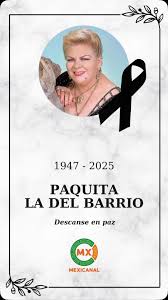The Legacy of Paquita la del Barrio: A Voice of Empowerment

Introduction
Paquita la del Barrio, born Francisca Viveros Barradas in 1947, is a renowned Mexican singer and songwriter famous for her boldness and lyrics that promote women’s empowerment. With over four decades in the music industry, she has become an icon not just in Mexico but worldwide, representing strength and resilience. Her songs often address themes of love, betrayal, and female empowerment, resonating with generations of female listeners and paving the way for discussions on gender equality in Latin music.
Career Highlights
Paquita began her career in the 1970s, gaining popularity with her unique style, which combines traditional ranchera music with a contemporary twist. She is known for her trademark attire of a red dress and heavy makeup, which has become her signature look. Her breakthrough came with songs like “Me Está Kuriando” and “Rata de Dos Patas,” where she expressed her discontent with machismo and highlighted the struggles women face in relationships. In 2018, she was awarded the Latin Grammy Award for Best Ranchera Album, cementing her place in music history.
Recent Developments
Recently, Paquita la del Barrio has been in the spotlight once again as she continues to tour and release new music. In 2023, she announced a series of concerts across the United States and Mexico, drawing large crowds eager to experience her powerful performances live. Additionally, she has collaborated with other musicians, further expanding her audience and showcasing her versatility as an artist. Her recent single, “Ni Una Más,” serves as a tribute to victims of gender-based violence and underscores her commitment to advocating for women’s rights.
Significance and Impact
Paquita’s music goes beyond entertainment; it serves as a tool for social change. With her powerful lyrics, she has become a voice for many women who feel unheard in patriarchal societies. Her influence extends beyond her performances; she uses her platform to raise awareness about domestic violence and gender inequality. As a result, she has become a symbol of empowerment not only in Mexico but also among Latinx communities around the world.
Conclusion
The legacy of Paquita la del Barrio is one of courage and resilience. As she continues to inspire generations through her music and activism, her message remains relevant in today’s society. In a world where women’s voices are often marginalized, Paquita stands tall, reminding everyone of the power of self-expression and the importance of fighting for equality. Her ongoing influence in music and activism suggests that she will continue to be a significant figure in the narrative of women’s rights for years to come.









